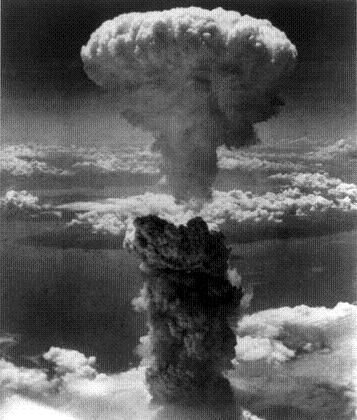


Towards the end of World War II in the Pacific Theatre, the United States was on the offensive conquering islands closer and closer to Japan by day. The events that officially concluded the war in the Pacific were the attacks on Hiroshima and Nagasaki, two massively populated cities that both contained military importance in Japan. At the time, President of the United States, Harry S. Truman, had to make the difficult decision whether or not to drop the Atomic Bomb, a newly invented super weapon that was made to induce huge amounts of damage and death to the targeted area, on Japan. The motive behind this decision was because of the unexpected attack on Pearl Harbor in Hawaii, by the Japanese navy, which took many American lives and destroyed much of our navy. Truman decided to drop the bomb, which resulted in the Japanese surrender to American forces. One of the two bombs, “Little Boy,” which was dropped on Hiroshima on August 6th, 1945 killed roughly 90,000-166,000 Japanese military members and civilians. The second bomb, “Fat Man,” dropped on Nagasaki on August 9th, 1945 killed between 60,000 and 80,000 people.
The major controversy behind the bombing of Japan was whether or not to help them in the reconstructions needed after the immense destruction and death in both cities afflicted by the explosion and radiation. After the surrender to General Douglas MacArthur he occupied Japan and wanted to strip Japan of its military without spurring on a future war out of retaliation and hate towards The United States. This was a smart choice rather than letting Japan rebuild its empire and getting stronger than before, then acting out in war again. This method was also used in the Treaty of Versailles after WWI when the allied forces penalized Germany for their actions, but at the same time, didn’t want them to struggle to rebuild their nation. Also there is the other approach; let them pay for their actions, and attempt to rebuild their nations by themselves. This may leave hate between nations and come up later in the future, and again risk the event of another World War or some other event of that nature. Even though the allied forces in WWI helped Germany a little and let them grow under their watchful eye, a Second World War occurred.
Maybe we shouldn’t have helped Japan, but at the same time, it was a very bold and respected decision by many nations. Also, it could have left a feud between us and what is now one of our most trusted allies. If it wasn’t for the choices chosen by our leaders at the time, our relationship between Japan could have ended up completely different than what it is today. We helped reform and restructure Japan into a powerful nation of prosperity. Although the actions taken by the U.S. were bold, the Japanese still needed to be punished for they did, and I believe they received a rightful punishment. The events that occurred happened for a reason and worked out to benefit everyone. I wish the conclusion in the European theatre could have ended similarly to the Pacific. Like every war, death is always a factor, and if it wasn’t for the brave people that lost their lives serving their country, history as we know it could have ended up much different, for better or for worse.
The Japanese government after the war was based on what our government chose to do with them. They also dropped the atomic bombs to end the war much quicker because of they wouldn't be able to end it fast, Russia would get involved.
ReplyDelete